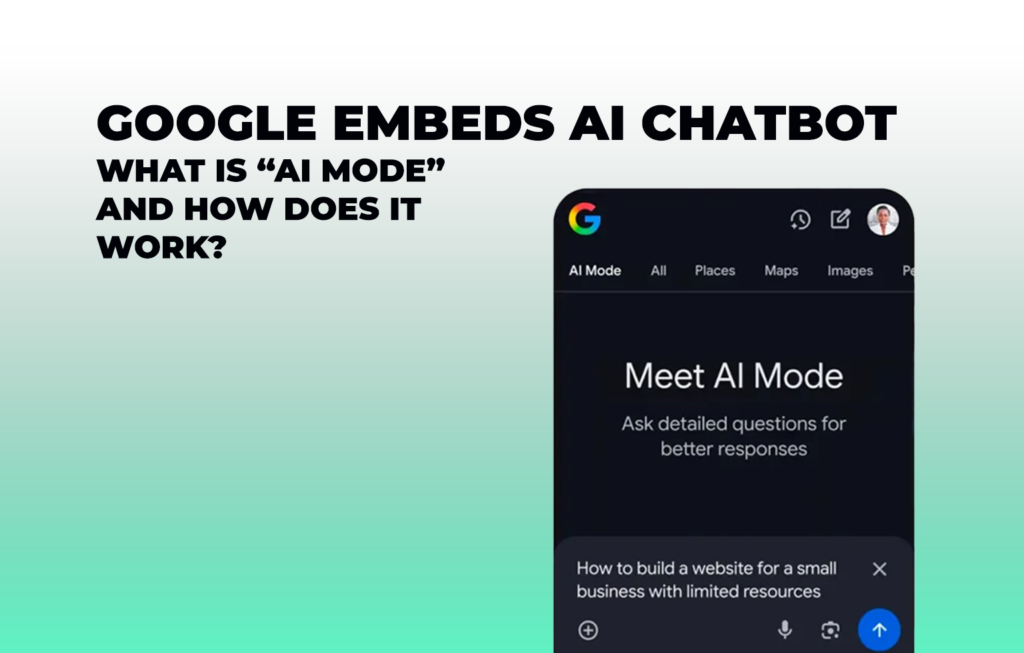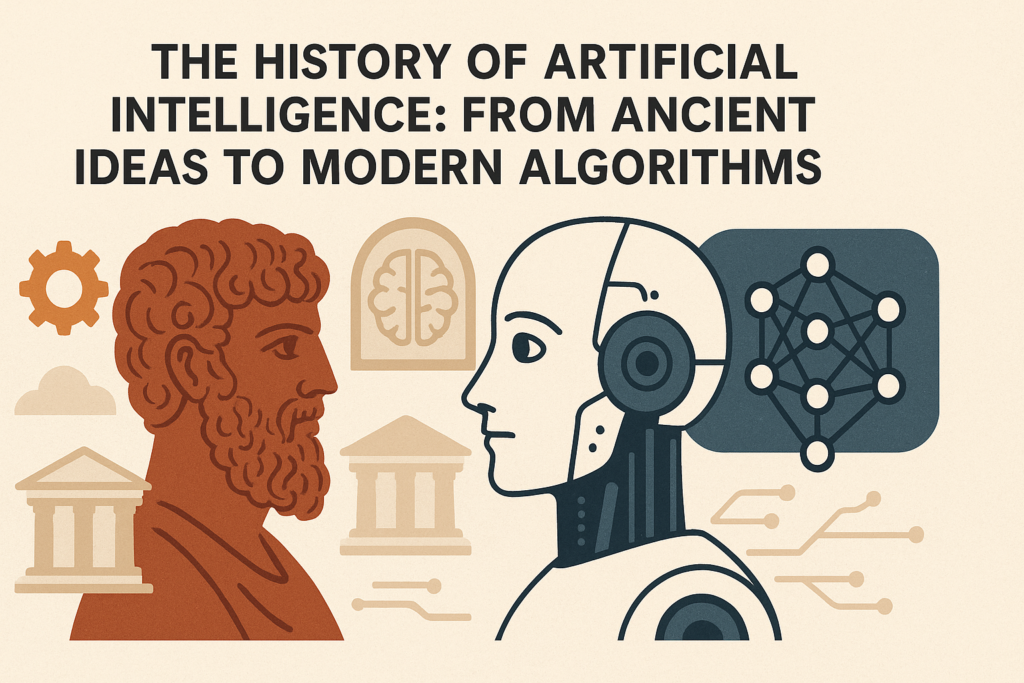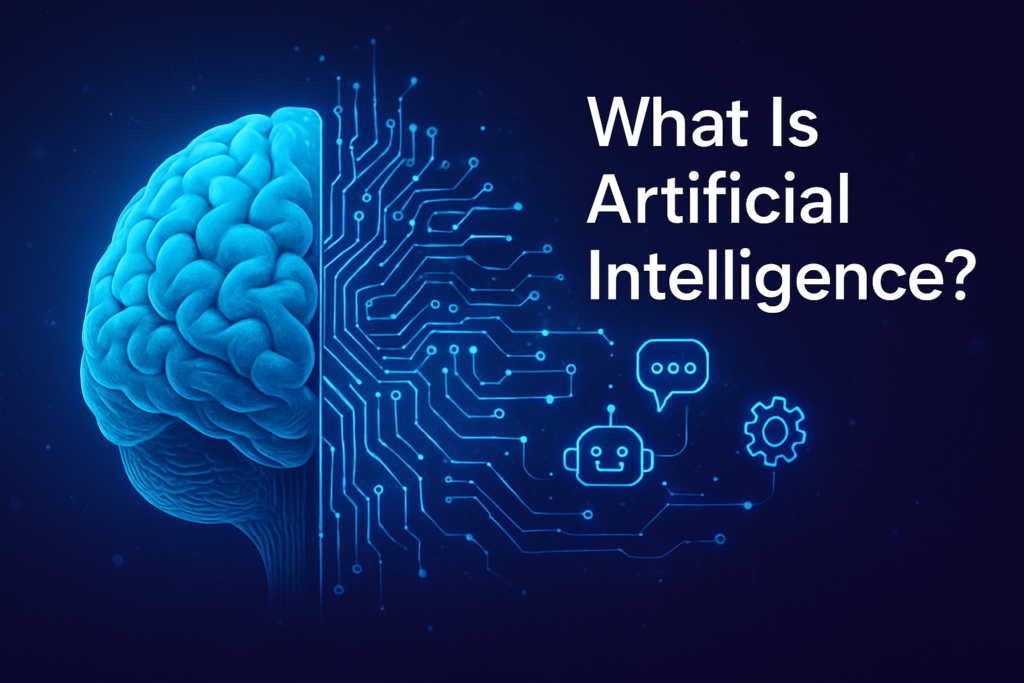Contents
- Google Embeds AI Chatbot in Search Results
- Google’s AI Revolution in Search
- Background: Google’s AI Journey and Competitive Pressure
- What is “AI Mode” and How Does it Work?
- Technical and Strategic Significance of Gemini Chatbot
- Broader AI Initiatives Announced at Google I/O
- Industry Perspectives and Analyst Insights
- Challenges and Risks for Google’s AI Search
- The Future of Search: How AI Could Transform User Behavior
- Ethical and Social Implications of AI in Search
- Conclusion: Google’s AI-Enhanced Search — A New Era
Google Embeds AI Chatbot in Search Results
Google’s AI Revolution in Search
Google is ushering in a new era for its search engine with the introduction of an “AI Mode” that embeds advanced chatbot capabilities directly into the search experience. Launched in the United States and unveiled at Google’s annual developer conference in Mountain View, this innovation marks a significant shift in how users interact with information online. In response to growing competition from AI-powered platforms like ChatGPT, Google is working to evolve its search from simply presenting lists of links to offering conversational, expert-like answers. This new AI integration aims to make searching more intuitive, allowing users to ask complex questions and receive nuanced, helpful responses in real time. By embedding its Gemini chatbot into the core of Google Search, the company hopes to maintain its dominance in the field while setting a new standard for interactive, AI-driven online inquiry.
Background: Google’s AI Journey and Competitive Pressure
Google’s journey into integrating artificial intelligence with its search engine began in earnest last year with the launch of AI Overviews, a feature that provided AI-generated summaries at the top of search results. While innovative, this early attempt faced user skepticism and occasional ridicule due to some strange and humorous AI responses—such as suggesting non-toxic glue for making cheese stick to pizza or recommending that people eat one rock daily. Despite these hiccups, Google’s AI Overviews have grown significantly in popularity, now used 1.5 billion times per month across more than 200 countries.
Meanwhile, competitors like OpenAI’s ChatGPT have rapidly reshaped user expectations around online search by offering conversational, human-like interactions that challenge Google’s traditional link-based results. This disruption has pushed Google to rethink how it delivers information, aiming to move beyond simple lists to interactive dialogues that feel more like talking to an expert.
Beyond competitive pressures, Google also faces intense scrutiny from regulators. Recent court rulings in the US accusing Google of holding a search monopoly have added urgency to its innovation efforts. The company must evolve its search experience not only to stay relevant and defend its massive advertising revenue but also to navigate regulatory landscapes demanding transparency and fairness. This complex backdrop sets the stage for Google’s latest AI integration, the “AI Mode,” as a strategic move to retain its leadership in the rapidly changing search market.
What is “AI Mode” and How Does it Work?
Google’s new “AI Mode” is a significant upgrade to its search engine, directly embedding advanced chatbot capabilities into the familiar search bar interface. Launched initially in the United States, this feature integrates Google’s latest AI technology — the Gemini chatbot platform — which represents the company’s next-generation AI system designed to handle complex reasoning and dialogue more effectively than before.
Unlike traditional search results that display a list of links and snippets, AI Mode allows users to engage in a more conversational and interactive experience. Users can ask longer, more intricate questions and receive detailed, coherent answers that feel more like a discussion with an expert than a mere list of web pages. This shift aims to reduce the time and effort users spend sifting through multiple results, offering instead a single, nuanced response that synthesizes information from across the web.
For example, instead of typing separate searches to compare electric vehicle models, users can ask AI Mode for a detailed comparison including price, range, and environmental impact in one query. Similarly, complex travel planning, technical troubleshooting, or even creative brainstorming can be handled more fluidly.
By employing advanced reasoning, AI Mode can better understand context and nuance, making it possible to follow up with related questions without needing to reframe or start over. This continuous, dialogue-like flow marks a step closer to an AI assistant rather than a conventional search engine.
For users, these improvements mean faster, more precise answers and a more intuitive search experience overall. The feature promises to reshape how people interact with information online, making searching less about keywords and more about meaningful conversations with AI.
Technical and Strategic Significance of Gemini Chatbot
The Gemini chatbot represents Google’s latest and most advanced AI platform, designed to push the boundaries of what conversational AI can achieve. Built on cutting-edge machine learning techniques and trained on vast datasets, Gemini stands out for its enhanced reasoning abilities, enabling it to understand and respond to more complex and nuanced queries than earlier models. Compared to competitors like OpenAI’s ChatGPT, Gemini aims to offer deeper integration within Google’s extensive ecosystem, providing a seamless AI experience that extends beyond just search.
Google CEO Sundar Pichai described Gemini’s launch as a “new phase of the AI platform shift,” emphasizing that this technology marks a turning point in how AI will be embedded into everyday products and workflows. Rather than being a standalone tool, Gemini is designed to serve as the intelligent backbone for various Google services, including Google Docs, Google Assistant, and potentially many others. This cross-platform integration aims to make AI a natural extension of users’ daily tasks, enhancing productivity and engagement.
Strategically, Gemini allows Google to deepen its relationship with users by offering highly personalized and context-aware assistance. This not only improves user experience but also generates valuable data insights, helping Google refine its AI models and advertising strategies. By embedding Gemini widely, Google hopes to maintain its dominance in search and digital services, ensuring users stay within its ecosystem for longer and rely on its AI capabilities for a broad range of needs.
Broader AI Initiatives Announced at Google I/O
At Google I/O, the company unveiled ambitious plans beyond search, including its upcoming AI-powered augmented reality (AR) glasses developed in partnership with eyeglass retailers Warby Parker and Gentle Monster. These new glasses aim to build on, and vastly improve, Google’s earlier foray into wearable tech—the original Google Glass—which failed to gain traction over a decade ago due to technical limitations and privacy concerns.
This time, Google is targeting a more mature market and technology environment. The new AR glasses will feature integrated cameras, microphones, and speakers, allowing users to interact with AI in real-time through natural voice and visual inputs. The glasses will embed Google’s advanced AI capabilities, such as the Gemini chatbot, offering seamless assistance in everyday activities without needing to pull out a smartphone.
Google’s renewed focus on wearable hardware comes amid rising competition, especially from Meta, which has partnered with Ray-Ban to produce its own AI-enabled smart glasses. By combining cutting-edge hardware with powerful AI software, Google aims to create an ecosystem where devices and services work in harmony to provide rich, context-aware experiences. This strategy reflects Google’s broader vision to embed AI deeply into daily life, extending its influence far beyond traditional search and into new dimensions of user interaction.
Industry Perspectives and Analyst Insights
Industry experts see Google’s new AI Mode as a significant step toward reshaping how users interact with search. Leo Gebbie, principal analyst at CCS Insight, highlights that the AI chatbot could greatly reduce the time users spend browsing through countless web pages by providing more direct, conversational answers. This enables users to ask longer and more complex queries, receiving personalized assistance that cuts through web clutter and streamlines their search experience.
However, the shift toward AI-powered answers raises important questions about Google’s core revenue model. Since the majority of Google’s income comes from ads linked to search clicks, Cory Johnson, chief market strategist at Epistrophy Capital Research, warns that more efficient AI responses might reduce the number of clicks on ads. This “efficiency paradox” could challenge Google’s traditional advertising-driven business, forcing the company to rethink how it monetizes search.
Overall, analysts agree that AI Mode reflects Google’s urgent need to innovate in a landscape transformed by competitors like ChatGPT. The integration of conversational AI not only enhances user experience but also signals a possible shift in Google’s business strategy, balancing user satisfaction with maintaining its advertising dominance.
Challenges and Risks for Google’s AI Search
Google’s AI search journey has faced notable challenges and risks that could affect user trust and adoption. Early attempts, such as the AI Overviews feature launched last year, were met with skepticism after some users encountered bizarre or inaccurate responses—like suggestions that non-toxic glue could help stick cheese to pizza or that geologists recommend eating rocks daily. These examples fueled doubts about the reliability of AI-generated content.
A major risk for Google is the potential for AI “hallucinations,” where the system confidently delivers false or misleading information. Maintaining user trust will depend on Google’s ability to enhance accuracy and transparency in its AI Mode. The company is investing heavily in improving data quality and fine-tuning its models to reduce errors and provide more dependable answers.
Ethical concerns also loom large, as AI-generated responses can shape public opinion and influence decision-making. Google must ensure responsible AI use by implementing content moderation practices that prevent misinformation, bias, and harmful outputs while respecting free expression.
All this is unfolding amid increased regulatory scrutiny, especially with recent court rulings highlighting Google’s monopoly status in search. This legal pressure forces Google to carefully balance innovation with compliance, as any misstep could invite further investigation or penalties.
Ultimately, Google faces the complex task of pioneering AI-powered search while managing the risks of inaccurate content and ethical pitfalls, aiming to build a trustworthy, next-generation search experience.
The Future of Search: How AI Could Transform User Behavior
The future of search is poised for a dramatic transformation as AI shifts the experience from simple keyword queries to rich, natural language conversations. With the integration of advanced AI like Google’s Gemini chatbot, users will increasingly interact with search as if speaking to a virtual expert or personal assistant. This shift promises more intuitive, context-aware responses that understand complex questions and provide detailed, nuanced answers.
Beyond answering questions, AI could handle multifaceted tasks such as summarizing lengthy documents, comparing options, planning trips, or making recommendations, effectively becoming an indispensable tool for decision-making. This evolution will not only enhance user convenience but also change how people approach online research, moving away from scanning multiple links toward conversational problem-solving.
However, these changes will ripple through the digital ecosystem. Content creators and SEO professionals will need to adapt strategies, as traditional traffic patterns might shift when AI synthesizes information instead of directing users to individual sites. This could alter how websites gain visibility and monetize their content.
Deeper AI integration also raises important privacy questions. As AI learns more about user preferences and behavior to personalize responses, Google must ensure robust protections to safeguard sensitive data and maintain user trust.
Looking ahead, AI-powered search will likely blend seamlessly with other Google services—like Maps, Docs, and Assistant—creating a cohesive, intelligent ecosystem. This unified approach aims to redefine how users find, interact with, and use information in everyday life.
Ethical and Social Implications of AI in Search
The integration of AI into search raises significant ethical and social considerations. One of the foremost responsibilities is ensuring that AI-generated responses are accurate, unbiased, and reliable, as users increasingly depend on these answers for critical decisions. Misinformation or subtle biases in AI outputs could distort public understanding and erode trust.
There is also a risk that users might grow overly dependent on AI-generated answers, potentially weakening critical thinking and analytical skills. This shift in information consumption could transform digital literacy, making it essential to educate users on how to engage thoughtfully with AI-powered tools.
Transparency remains a key ethical debate. Should Google clearly disclose when content is AI-generated? Openness about AI’s role in producing answers helps maintain accountability and allows users to critically evaluate the information they receive.
As one of the world’s leading technology companies, Google has a significant role in setting industry standards for trustworthy AI in search. Its approach to responsible AI use will influence public perception and could shape regulatory frameworks globally. Balancing innovation with ethical stewardship will be crucial to ensure AI enhances knowledge without compromising social values or user autonomy.
Conclusion: Google’s AI-Enhanced Search — A New Era
Google’s bold integration of chatbot AI into its search engine marks the beginning of a new era in how we find and interact with information. By embedding the Gemini-powered AI Mode, Google aims to transform search from a simple list of links into a dynamic, conversational experience. This innovation promises greater efficiency and more nuanced answers but also requires careful balance—ensuring accuracy, maintaining ethical standards, and preserving a positive user experience.
Facing fierce competition from AI challengers like ChatGPT, Google’s move is both strategic and necessary to retain its dominance in the evolving digital landscape. However, many questions remain about how users will adapt to this shift and how content creators and businesses will respond to AI-driven changes in search behavior.
Ultimately, Google’s AI Mode may redefine what it means to “search” online, shifting from keywords and clicks to meaningful dialogue between humans and intelligent machines, shaping the future of information access for years to come.



